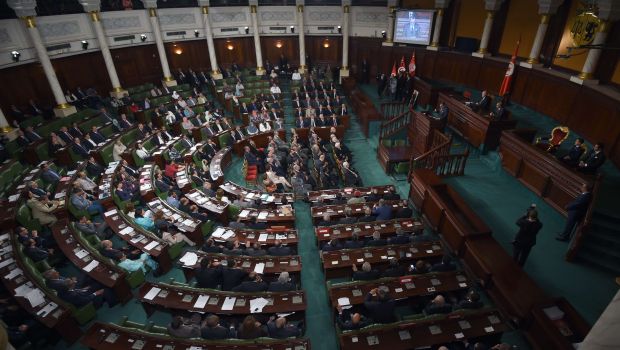
Moroccan King Mohammed VI (R) gives a speech at Tunisia’s Constituent Assembly on May 31, 2014 in Tunis. King Mohammed arrived in Tunis on May 30, 2014 for his first official visit to the country since the January 2011. (AFP PHOTO / FETHI BELAID)
Two days of negotiations ended without an agreement on whether the presidential or parliamentary poll should come first.
Some also renewed calls for the polls to be held on the same day, despite a previous agreement to hold separate elections.
The elections, which are expected by the end of 2014, will be the second vote since the 2011 uprising that ousted long-time president Zine El-Abidine Ben Ali, and the first since a new constitution was passed in January of this year.
According to the results of a vote by the leaders of parties represented in Tunisia’s Constituent Assembly, nine parties back holding parliamentary elections before the presidential polls, and 10 parties voted for the opposite.
Observers expect the timing to be settled by a vote in the Constituent Assembly if the parties are unable to come to an agreement among themselves.
The option to hold both elections simultaneously has begun to gather support, and is seen by some in Tunisia as more in keeping with the country’s new constitution.
Speaking to Asharq Al-Awsat, Amer Laarayedh, a member of the Islamist Ennahda Movement’s executive bureau, said that his party preferred holding parliamentary elections first.
Ennahda’s position is backed by the Social Democratic Path (formerly known as the Communist Party).
But Ennahda’s chief rival, the Leftist Nidaa Tounes movement, called for the presidential election to be held before the parliamentary polls.
The Popular Front, which is comprised of 12 leftist and nationalist political parties, and Ettakatol, led by Mustapha Ben Jafar, share the same view as that of Nidaa Tounes.
While the Popular Front said that it would nominate Hamma Hammami for president, Ettakatol intends to field Ben Jafar for the post.
Hammami, the spokesman for the Popular Front, told Asharq Al-Awsat that his Front favored an earlier presidential election, to take the post out of the political contest between the parties.
Hammami also voiced fears that a government coalition could be formed to influence the presidential election in the event of the parliamentary polls were held first.
